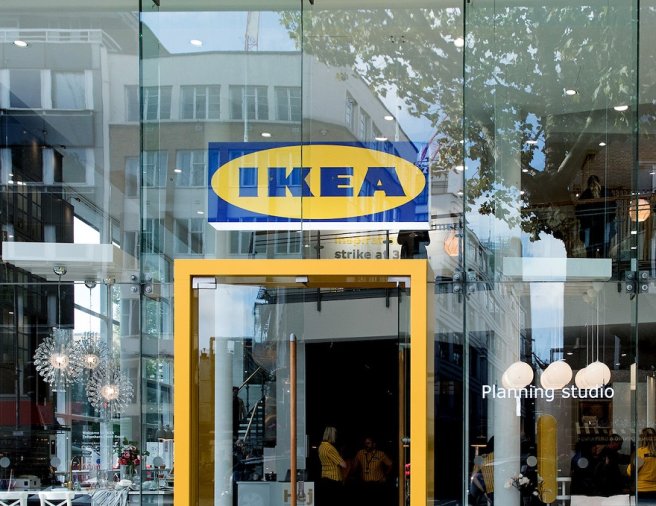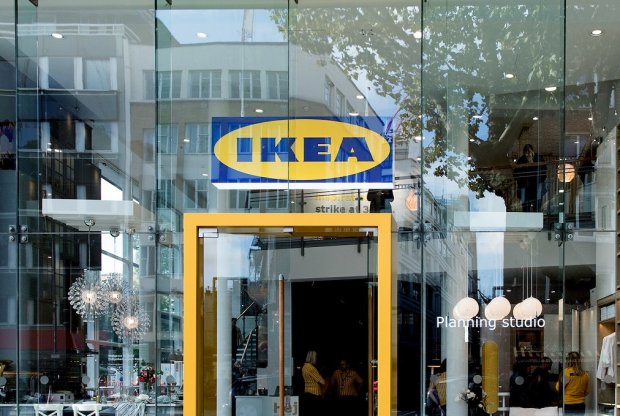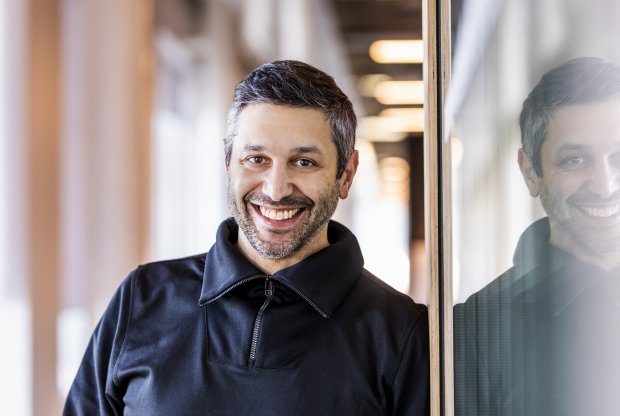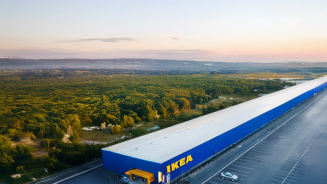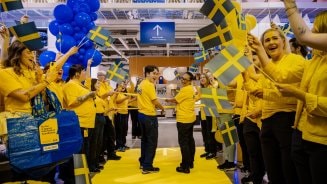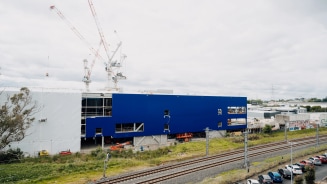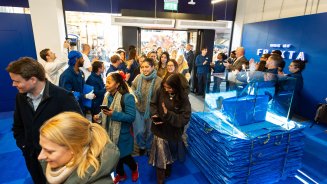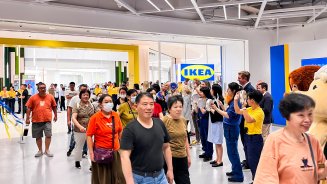Over the last 18 months, our homes have become more important to us than ever. The IKEA Life at Home report has shown how people have had to adapt their homes to meet their new realities, optimise space, create functional homes for changing needs, and find a balance between productivity and relaxation.
Over that time there has been a higher demand for products that support those new needs, including workplace and outdoor furniture and storage solutions. Like many other retailers, Ingka Group has faced an unprecedented demand for products. And while IKEA has shipped more than ever before, it was still not possible to meet the needs of all customers.
To support customers to adapt in these unprecedented times, Ingka Group made significant investments in physical and online retail operations focused on meeting customers’ changing needs, to meet them how, when and where they wanted.
For FY21, investments (capital expenditures) totaled EUR 3.2 billion, including extensive investment in physical stores, distribution and customer fulfilment networks, omnichannel transformation, digital customer experience, renewable energy, zero-emission vehicles and forestry. These investments meant that IKEA could continue to deliver on its promise to offer a large variety of products for all parts of the home to customers all at once.
“During the pandemic, despite rising costs all around us, Ingka Group kept prices stable with the aim to keep prices as low as possible for customers,” says Tolga Öncü, Retail Operations Manager at IKEA Retail (Ingka Group). “It was the right thing to do.”
Additionally, the IKEA franchisor, Inter IKEA Group, absorbed additional supply chain-related costs amounting to EUR 250 million in FY21 to soften impact on retail prices. They say they plan to absorb additional costs in FY22.
One of the key priorities through the pandemic was also to ensure the livelihoods of co-workers by ensuring the long-term success of the business.
Industry-wide supply chain challenges
However today, like many other industries, IKEA continues to face significant transport and raw material constraints driving up costs, with no anticipated break in the foreseeable future. Disruptions are expected far into 2022. The biggest cost increases due to transport and purchase prices are being felt most in North America and Europe.
“Unfortunately, now, for the first time since higher costs have begun to affect the global economy, we have to pass parts of those increased costs onto our customers,” Öncü says.
Prices will go up across Ingka Group markets, reflecting the changing economic conditions affecting all industries. The average of the increase in Ingka Group is around 9% globally, with variations across Ingka Group countries and the range, reflecting localised inflationary pressures, including commodity and supply chain issues.
“We are taking this difficult step right now to ensure we can live up to our purpose to create a better everyday life for the many people, and to safeguard our competitiveness and the resilience of our company,” says Öncü. “However, affordability will always be a cornerstone for us.”
Ingka Group has always kept its gross margin as low as possible to keep prices low. “We invest a large part of our net income back into the business to keep prices as low as possible, particularly for the lowest priced range, ensuring that as many people as possible continue to afford IKEA,” he says.
More than ever before, IKEA is committed to expanding the percentage of the range that consists of low and very low prices. The ambition is for more than half of the range be low price.
Ultimately, Ingka Group takes the net income that is not reinvested in the business and pays it as dividends to INGKA Foundation, the owner of Ingka Group, which has a charitable purpose to create a better everyday life for the many people in need. In turn, INGKA Foundation provides funding to the IKEA Foundation.
Investing for the future
Heading into 2022, Ingka Group will continue to invest in improving the customer experience, opening more stores, faster and more affordable and sustainable delivery options, such as click and collect in stores that are around one-fifth the cost of home delivery, and thousands of neighborhood pick-up points.
“We’ll open 30 new customer meeting points in various formats in this financial year, from the traditional stores with the full experience to planning studios and inner city stores with same day delivery,” says Öncü.
Additionally, Ingka Group is continuing to focus on creating more efficiencies to support the omnichannel strategy going forward. It is shortening lead times and making delivery more sustainable by routing more fulfilment through blue box stores rather than only customer distribution centers. “Last financial year we saw a big increase in total volumes fulfilled, and 51% of total volume was fulfilled from stores, an increase from 43% the previous year,” Öncü says.
Ingka Group also plans to start more than 80 projects to improve store fulfilment capabilities, for example using robotics, automation and drones, compared to 32 projects in FY21.
Additionally, the IKEA commitment is to become climate positive by 2030, and Ingka Group has committed to invest an additional EUR 4 billion across the coming years into renewable energy, in addition to EUR 2.5 billion in investments in the past decade.
Meanwhile, Inter IKEA Group is working to mitigate the effects of the global supply chain disruptions in operations and improving the availability of IKEA products. They have already put in place a range of measures, including using different transport solutions, such as charting extra vessels and loaders to get ships full of IKEA products into the retail markets. Inter IKEA Group says it will continue to work with partners to secure the availability of raw materials, minimize disruptions in production and secure logistics capacities.
While longer term visibility of future economic conditions is challenging given current instability and inflation across markets, Öncü says Ingka Group will remain responsive to future changes. “Our intention is to give back to the customer any decrease in purchase prices we get,” he says.
More than ever, Ingka Group will rely on its people and markets to continue acting with an entrepreneurial spirit. “And together,” Öncü says, “we will ensure that a competitive offer is available, maintain or increase price distance and continue to enable the many people create a better and more sustainable life at home.”
Media enquiries
For further information, journalists and media professionals can contact us at [email protected] or by calling +46 70 993 6376
